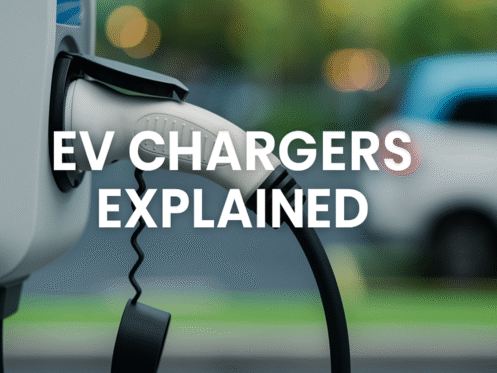According to the Colorado Energy Office (CEO), Denver, CO, led the way in the electric vehicle market share as of December 2024. If you’re a Denver resident and need convenient EV charging, installing a charging station at home is a smart way to give your electric vehicle a quick, convenient boost. The experts at High 5 Plumbing, Heating, Cooling & Electric have some helpful information to make choosing the right type of EV charger for your vehicle easy.
What Are EV Chargers?
So, what are EV chargers, and how does electric car charging work? EV chargers, or electric vehicle supply equipment (EVSE), are a type of device that provides electric vehicles with the electrical power they need to operate. These chargers convert electricity from the grid into a usable form for your vehicle’s battery. When charging is complete, your EV is ready to drive.
EV chargers are available in three different options: Level 1, Level 2, and Level 3 DC fast chargers. Each one has different charging speeds and capabilities. It’s important to determine which EV charger is right for you to make sure your electric vehicle receives the right type of charge and that it’s charged safely.
Types of EV Chargers
Here’s what you need to know about the different types of chargers available for your home in the Denver, CO, area.
Level 1 chargers
Level 1 EV chargers use a 120V AC power source, which is equivalent to a standard household electrical outlet. This type of charger has the slowest charging speed available and adds approximately two to five miles of range to your electric vehicle per hour of charging. A Level 1 charger is ideal for EV owners who tend to let their vehicles charge overnight at home. Many EVs come with this type of charger when purchased.
Level 2 chargers
A Level 2 EV charger is more powerful than a Level 1 charger and utilizes a 240V AC outlet, which is similar to appliances like electric ovens or clothes dryers. The charging speed is faster, adding around 10 to 20 miles of range to your EV per charging hour. Many homeowners choose Level 2 for home charging, which requires professional installation. Most public EV charging stations commonly stock this charger style.
Level 3 DC fast chargers
The Level 3 DC fast charger is a high-voltage, high-power 480V DC charger. It has the fastest charging speed, adding around 60 to 200 miles of range in just 20 to 60 minutes of charging. This option is also common at many larger public charging stations found in high-traffic areas or along major highways. The Level 3 DC fast charger has several connection types, including CCD and NACS, which was once Tesla’s main connector.
Factors To Consider When Choosing an EV Charger
Now that you know more about the different EV charging types, here are some key factors to consider when deciding which one is right for you:
- AC or DC charger: An AC charger requires your EV’s onboard charger to convert electricity to DC for the battery, while a DC charger bypasses this process and delivers power directly to the battery for faster charging.
- Total charging time: If speed is a priority, chargers with a higher charging level (like Level 2 or Level 3 DC) will charge your EV much faster and take less time to achieve a full charge than a Level 1 charger.
- Installation costs: A Level 1 charger is easy to install and only needs a standard outlet, while a Level 2 charger requires professional installation of a dedicated outlet.
- Vehicle compatibility: Most of the EVs sold today are compatible with Level 1 and Level 2 chargers, but certain models may be specifically designed for DC fast charging only.
- Connector type: CCS and NACS connectors are used for DC fast charging, but you may be able to purchase a special adapter that allows your EV to connect to different connector styles.
Benefits of Investing in the Right EV Charger
These are some of the benefits of investing in the right EV charger for your home:
- Speed and convenience: Skip the wait at public charging stations and enjoy the ease of overnight charging at home — wake up to a full battery every day.
- Money savings: Home charging is typically cheaper than public stations, especially during off-peak hours. You may also qualify for utility incentives, which can help you save long-term on fuel and maintenance.
- Eco-friendly: Charging at home reduces your carbon footprint and supports a cleaner future. It can also increase your home’s appeal to eco-conscious buyers.
Tips for Installation and Maintenance
Follow these tips for a successful EV charger installation and good routine maintenance:
- Select the right location: EV chargers should be located in a dry, well-ventilated area like your garage, and they should have ample clearance around them for easy access.
- Location near electrical panel: Try to keep the distance from your main electrical panel to the charger as short as possible to reduce your installation cost and potential fire risks.
- Protect your charger: Make sure your EV charger is protected from weather conditions like rain, snow, and high temperatures to prevent damage.
- Use a professional: Always hire a licensed electrician like the team at High 5 to make sure your charger complies with all electrical codes.
Looking To Install an EV Charger for Your Home? Call The Professionals High 5 for All Your Electrical Needs
For the best electrician services in the Denver region, make sure you call the High 5 Plumbing, Heating, Cooling & Electric team without delay. We know that having power throughout the house is vital and that one light or socket out can be a big hassle. If you need an EV charger installed, contact us today, and we’ll guide you to the right solution.

